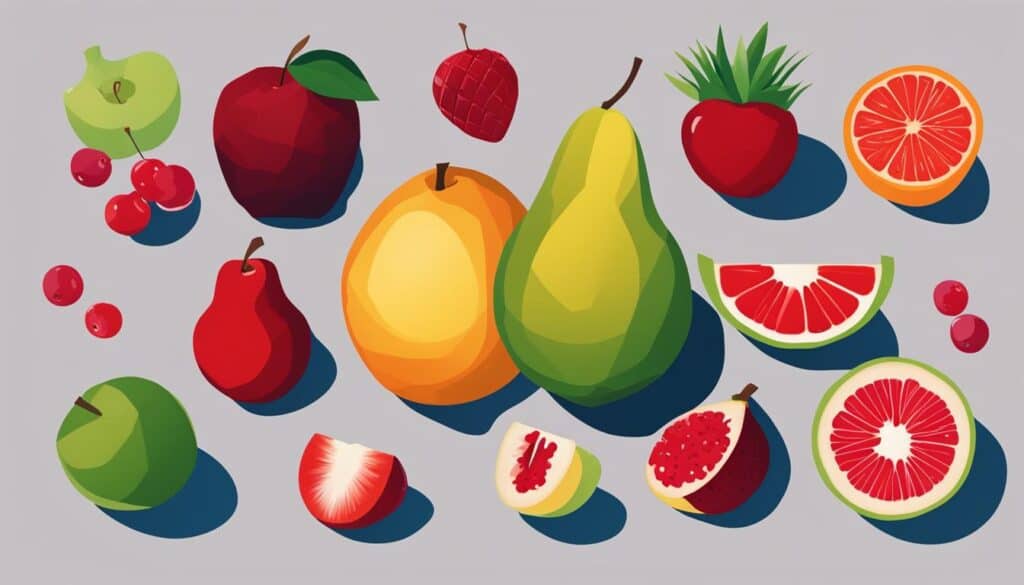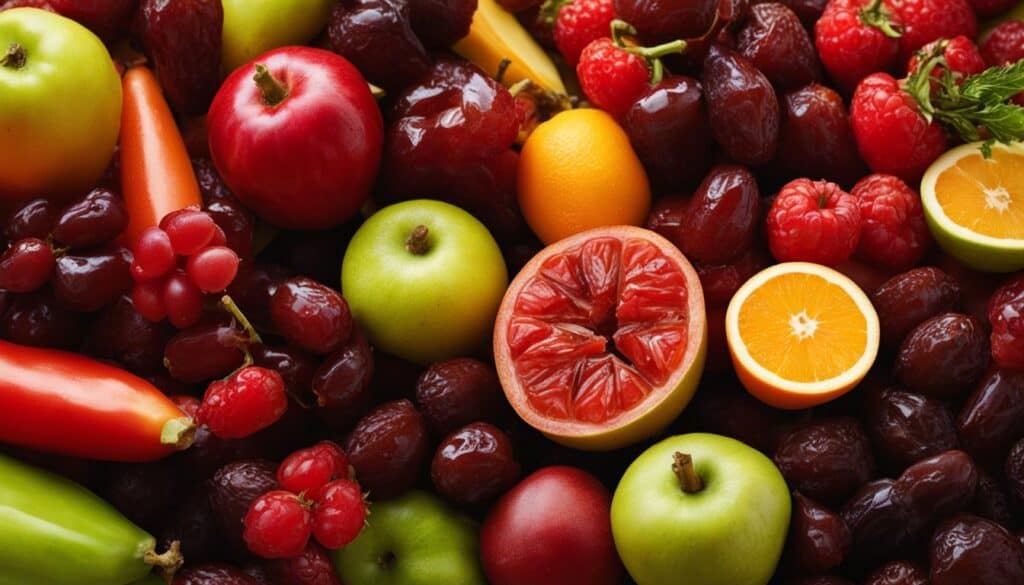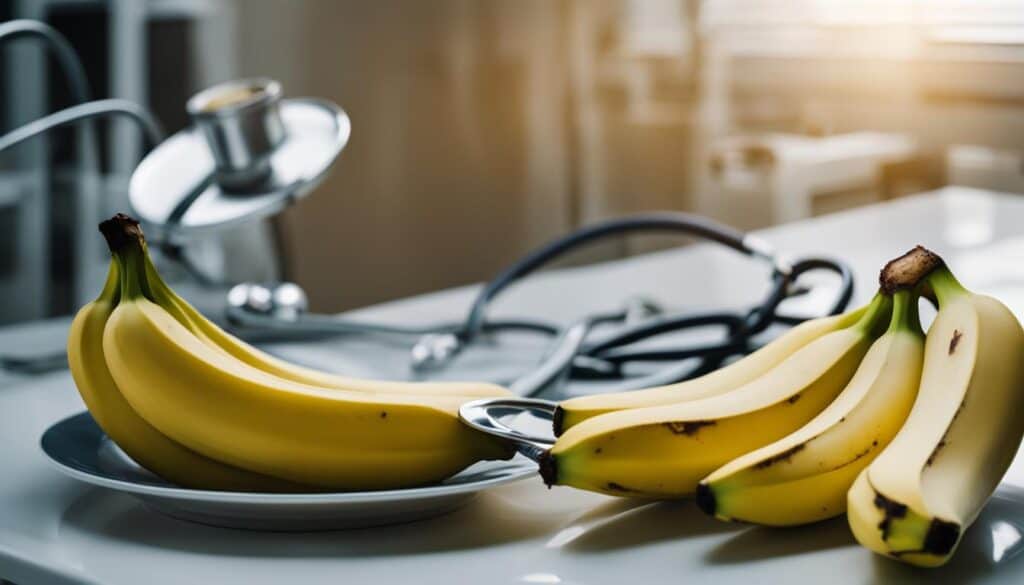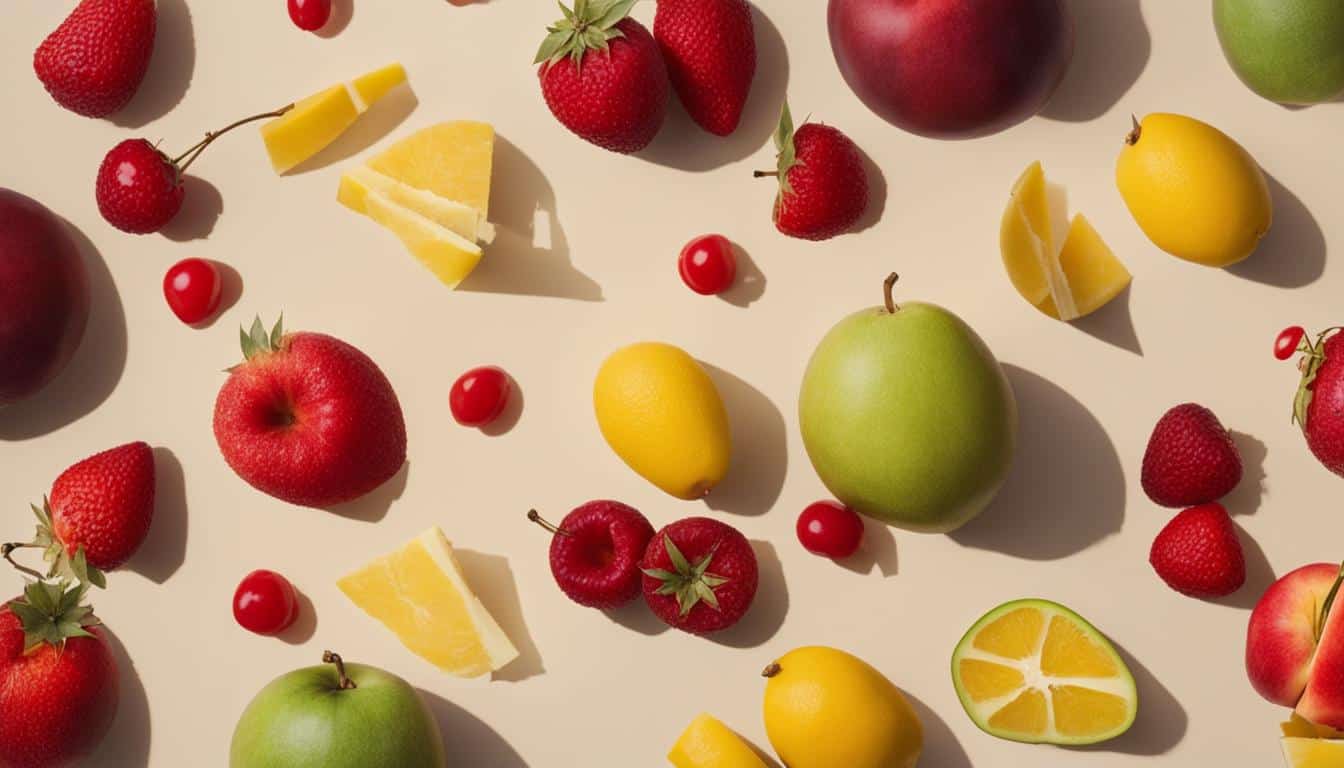During pregnancy, it is important to be aware of which fruits should be avoided for the safety of both the mother and the baby. While fruits are generally recommended for a healthy pregnancy diet, there are certain fruits that can be potentially harmful. Pineapple, grapes, unripe papayas, tamarind, dates, bananas, bitter melon, and frozen berries are some fruits that should be avoided during pregnancy due to specific reasons. It is also important to wash fruits thoroughly before consuming them and cut away any bruised parts.
Key Takeaways:
- It is important to avoid certain fruits during pregnancy for the safety of both the mother and the baby.
- Pineapple, grapes, unripe papayas, tamarind, dates, bananas, bitter melon, and frozen berries are some fruits that should be avoided.
- Wash fruits thoroughly before consuming them and cut away any bruised parts.
- Consider individual health conditions before consuming bananas, as they can trigger allergic reactions and raise blood sugar levels.
- It is best to avoid freeze-dried and packaged food, including frozen berries, during pregnancy and opt for fresh fruits instead.
Pineapple
Pineapple is a delicious and popular fruit, but it is one of the fruits to avoid during pregnancy. This is because pineapple contains an enzyme called bromelain, which can have negative effects on pregnancy. Bromelain has been found to change the texture of the cervix and may induce premature contractions. These contractions can lead to irregular bleeding and potential harm to the baby. To ensure a healthy pregnancy journey, it is best to avoid consuming pineapple during pregnancy.
| Effects of Pineapple During Pregnancy | Recommendation |
|---|---|
| Bromelain can change cervical texture | Avoid consuming pineapple |
| May induce premature contractions | |
| Potential irregular bleeding | |
| Possible harm to the baby |
While pineapple can be a healthy addition to a regular diet, it is advisable to refrain from consuming it during pregnancy to ensure a safe and healthy pregnancy journey. If you are unsure about which fruits are safe to consume during pregnancy, it is always best to consult with your healthcare provider for personalized advice.
Conclusion
In conclusion, it is important to be aware of the fruits to avoid during pregnancy in order to maintain a healthy pregnancy. Pineapple is one such fruit that should be avoided due to its potential to induce premature contractions and cause cervical texture changes. By making informed choices about the fruits consumed during pregnancy, mothers can prioritize their own health and the well-being of their baby.
Grapes

Grapes, also known as the Queen of Fruits, are a popular choice when it comes to snacking and adding flavor to various dishes. However, when it comes to pregnancy, it’s essential to be aware of the potential risks associated with consuming grapes.
While grapes offer nutritional benefits like antioxidants and vitamins, they also contain a compound called resveratrol. Some studies suggest that high amounts of resveratrol can cause hormonal imbalance, which may have negative effects during pregnancy. Hormonal imbalance can disrupt the delicate hormonal environment required for a healthy pregnancy and could potentially impact fetal development.
Additionally, grapes are considered heat-generating fruits. This means that they can increase body heat, which may not be ideal during pregnancy. High body temperature during pregnancy has been linked to an increased risk of birth defects and other complications. Therefore, it is advisable to consume grapes in moderation or avoid them altogether during pregnancy to ensure the well-being of both the mother and the baby.
It’s important to prioritize the safety and health of both the mother and the baby during pregnancy. While grapes are generally considered safe for consumption, their potential risks should be taken into consideration. Consulting with a healthcare professional or a registered dietitian can provide personalized guidance on which fruits to avoid during pregnancy and ensure a balanced and nutritious diet for a healthy pregnancy journey.
Unripe Papayas
When it comes to fruits to avoid during pregnancy, unripe papayas should be on the list. While ripe papayas are rich in vitamins and iron and are generally safe to consume during pregnancy, unripe papayas can pose potential risks.
Unripe papayas contain latex, a common allergen that can cause allergic reactions in pregnant women. Allergic reactions can manifest in various ways, such as skin rashes, itching, or swelling, and can potentially harm both the mother and the baby. It is advisable to refrain from consuming unripe papayas to prevent any potential harm.
Furthermore, unripe papayas contain an enzyme called papain, which is known to trigger early uterine contractions. These contractions can potentially lead to complications, such as premature birth or a strained pregnancy. To ensure a healthy and safe pregnancy journey, it is recommended to avoid consuming unripe papayas.
| Prohibited Fruit | Reasons to Avoid |
|---|---|
| Unripe Papayas | Contains latex, causing allergic reactions in some pregnant women |
| Contains papain, which can trigger early uterine contractions |
Important Points to Remember:
- Avoid consuming unripe papayas during pregnancy due to potential risks.
- Unripe papayas contain latex, which can cause allergic reactions in some pregnant women.
- The enzyme papain in unripe papayas can trigger early uterine contractions.
- Ensure to opt for ripe papayas instead, which are safe and beneficial during pregnancy.
Tamarind

Tamarind is a fruit that should be consumed in moderation during pregnancy due to its potential effects on progesterone levels. Progesterone plays a crucial role in maintaining a healthy pregnancy by supporting the growth of the uterine lining and preventing contractions. However, certain compounds found in tamarind can suppress the production of progesterone, which may lead to complications such as preterm birth and cell damage.
While tamarind is not the most harmful fruit for expectant mothers, it is advisable to exercise caution when consuming it. The key is to consume tamarind in moderation, ensuring that it does not have a significant impact on progesterone levels. It is always recommended to consult with a healthcare professional or a nutritionist to determine the appropriate amount of tamarind to include in your diet during pregnancy.
Remember, the goal is to maintain a healthy pregnancy by making informed choices about the fruits you consume. By understanding the potential risks associated with certain fruits, like tamarind, you can ensure a safe and enjoyable pregnancy journey.
Risks Associated with Tamarind during Pregnancy
| Risks | Description |
|---|---|
| Progesterone Suppression | Tamarind contains compounds that can suppress the production of progesterone, a hormone crucial for maintaining a healthy pregnancy. |
| Preterm Birth | Low levels of progesterone can increase the risk of preterm birth, which may have long-term consequences for the baby’s health. |
| Cell Damage | Suppressed progesterone levels can potentially lead to cell damage in the developing fetus, affecting its overall growth and development. |
Fruits to Avoid During Pregnancy: The Hazards of Dates

When it comes to maintaining a healthy pregnancy diet, it’s essential to be aware of the fruits that should be avoided for the well-being of both the expectant mother and the baby. Dates, a popular fruit known for its rich nutritional content, can pose potential risks if consumed excessively during pregnancy. While dates are packed with vitamins and nutrients, it’s important to exercise moderation to prevent any adverse effects.
Consuming a high quantity of dates during pregnancy can lead to increased body heat, which in turn may trigger early contractions. It’s recommended to limit the consumption of dates to only 1-2 per day. By practicing moderation, expectant mothers can continue to enjoy the benefits of dates while minimizing the associated risks.
To outline the potential hazards of consuming excessive dates during pregnancy, let’s take a look at the following table:
| Risks | Effects |
|---|---|
| Increased Body Heat | Potential for early contractions |
As shown in the table, consuming too many dates can cause the body to heat up, potentially leading to early contractions. It’s crucial for expectant mothers to be mindful of their fruit intake and prioritize their health and the well-being of their baby.
While dates are a nutritious fruit, it’s important to consume them in moderation during pregnancy to avoid any potential risks. By maintaining a balanced and varied diet, expectant mothers can ensure both their own health and the healthy development of their baby.
Bananas: A Fruit to Approach with Caution During Pregnancy

When it comes to fruits to avoid during pregnancy, bananas may not be at the top of the list. However, it’s important to consider individual health conditions before incorporating them into your pregnancy diet. While bananas are generally considered healthy, there are a few factors that expectant mothers should be aware of.
One consideration is allergies. Bananas contain a protein called chitinase, which is similar to the latex found in rubber gloves and balloons. This means that individuals with latex allergies may also be allergic to bananas. If you have a known latex allergy, it’s advisable to avoid bananas during pregnancy to prevent any potential allergic reactions.
Another factor to consider is gestational diabetes. Bananas are naturally sweet and contain a moderate amount of sugar. If you have been diagnosed with gestational diabetes, it’s important to monitor your blood sugar levels and follow a controlled diet. Consult with your healthcare provider to determine whether bananas can be included in your meal plan or if you should limit your consumption.
Ultimately, each pregnancy is unique, and it’s important to prioritize your health and the health of your baby. If you have any concerns about consuming bananas during pregnancy, it’s best to consult with your healthcare provider for personalized guidance.
Quote:
“While bananas are generally considered healthy, there are a few factors that expectant mothers should be aware of.”
Table: Fruits to Avoid During Pregnancy
| Fruit | Reason to Avoid |
|---|---|
| Pineapple | Potential for premature contractions |
| Grapes | Possible hormonal imbalance and heat generation |
| Unripe Papayas | Possibility of allergic reactions and uterine contractions |
| Tamarind | Potential suppression of progesterone and cell damage |
| Dates | Possible increase in body heat and early contractions |
| Bananas | Potential for allergic reactions and impact on blood sugar levels (for individuals with allergies or gestational diabetes) |
| Bitter Melon | Uterus irritants and risk of premature birth |
| Frozen Berries | General recommendation to avoid freeze-dried and packaged food |
Bitter Melon

Bitter melon is a fruit that should be avoided during pregnancy due to its potential harmful effects. It contains compounds such as quinine, saponin, glycosides, and morodicine, which are known to be uterus irritants. These substances can stimulate contractions and potentially lead to premature birth. Consuming bitter melon during pregnancy can also cause various discomforts, including nausea, rashes, diarrhea, and abdominal pain.
It is important for expectant mothers to prioritize their safety and the health of their baby by avoiding bitter melon during pregnancy. While bitter melon may have potential health benefits for other individuals, the risks associated with its consumption during pregnancy outweigh any potential advantages. It is advisable to consult with a healthcare professional or a prenatal nutritionist for guidance on maintaining a healthy diet during pregnancy.
During this critical period, it is crucial to focus on consuming fruits that are safe and beneficial for both the mother and the baby’s well-being. By being aware of the harmful fruits to avoid during pregnancy, expectant mothers can make informed choices to protect their health and ensure a healthy pregnancy journey.
In summary, bitter melon should be avoided during pregnancy due to its potential to stimulate contractions, increase the risk of premature birth, and cause discomfort. Consulting with a healthcare professional or a prenatal nutritionist is recommended for personalized dietary advice during pregnancy.
Frozen Berries
Frozen berries are a popular choice for many people due to their convenience and long shelf life. However, when it comes to pregnancy, it is important to exercise caution when consuming frozen berries. While they can still provide some nutritional benefits, there are certain factors to consider.
One concern with frozen berries is the potential for them to be freeze-dried and packaged. This process may involve the addition of sugars or preservatives, which may not be ideal for pregnant women. It is always best to opt for fresh fruits whenever possible, as they provide a higher level of nutrients without any added ingredients.
Another factor to consider is the risk of contamination. Frozen berries have been associated with foodborne illnesses such as norovirus and hepatitis A. To minimize the risk, it is important to ensure that the frozen berries are properly stored and thawed before consumption. Washing the berries thoroughly before eating them can also help reduce the risk of contamination.
Possible Alternatives
If you are craving the taste of berries during pregnancy, there are alternatives to consider. Fresh berries, such as strawberries, blueberries, and raspberries, can provide similar nutritional benefits without the potential risks associated with frozen berries.
Additionally, you can also explore other fruits that are safe and beneficial during pregnancy. Watermelon, apples, kiwis, oranges, and lemons are excellent options that can provide a variety of vitamins and minerals.
| Frozen Berries | Fresh Berries |
|---|---|
| May contain added sugars or preservatives | Natural and free from added ingredients |
| Potential risk of contamination | Lower risk of contamination |
| Convenient and long shelf life | Best consumed fresh |
In summary, while frozen berries can still be enjoyed during pregnancy, it is important to be mindful of the potential risks and choose fresh fruits whenever possible. By prioritizing fresh, nutritious options, you can ensure a healthy and safe pregnancy journey.
Conclusion
Throughout your pregnancy journey, maintaining a healthy and well-balanced diet is essential for both you and your baby’s well-being. While there are certain fruits that should be avoided, there is a wide variety of delicious and nutritious fruits that can safely be incorporated into your pregnancy diet.
Watermelon, apples, kiwis, lemons, oranges, and fresh berries are just a few examples of healthy fruits that are highly recommended during pregnancy. These fruits provide essential vitamins, minerals, and antioxidants that support your prenatal nutrition needs.
By prioritizing your prenatal nutrition and making informed choices about the fruits you consume, you can ensure a healthy and safe pregnancy journey. Remember to wash fruits thoroughly and cut away any bruised parts before enjoying them.
As always, consult with your healthcare provider for personalized advice and recommendations regarding your specific dietary needs during pregnancy. With a well-rounded pregnancy diet that includes an array of healthy fruits, you can maintain a healthy pregnancy and provide your baby with the essential nutrients they need for optimal development.
FAQ
What fruits should be avoided during pregnancy?
Pineapple, grapes, unripe papayas, tamarind, dates, bananas, bitter melon, and frozen berries are some fruits that should be avoided during pregnancy.
Why should pineapple be avoided during pregnancy?
Pineapple contains bromelain, an enzyme that can change the texture of the cervix and induce premature contractions.
What is the concern with grapes during pregnancy?
Grapes contain resveratrol, a compound that can cause hormonal imbalance. They are also considered heat-generating fruits, which may not be ideal during pregnancy.
Why should unripe papayas be avoided during pregnancy?
Unripe papayas contain latex, a common allergen that can cause allergic reactions in pregnant women. They also contain an enzyme called papain, which can trigger early uterine contractions.
What is the concern with tamarind during pregnancy?
Tamarind contains compounds that can suppress the production of progesterone, which is crucial for a healthy pregnancy. Low progesterone levels can lead to preterm birth and may even cause cell damage in the fetus.
Can dates be consumed during pregnancy?
Dates are rich in vitamins and nutrients, but it is advised to consume them in moderation. Consuming too many dates can cause the body to heat up, potentially leading to early contractions.
Are bananas safe to eat during pregnancy?
Bananas are generally considered healthy, but they should be avoided if the person has allergies or gestational diabetes. Bananas contain chitinase, a latex-like substance that can trigger allergic reactions. Additionally, they are high in sugar, which can raise blood sugar levels.
What are the risks of consuming bitter melon during pregnancy?
Bitter melon contains quinine, saponin, glycosides, and morodicine, which are all uterus irritants that can potentially trigger premature birth. Consuming bitter melon can also cause nausea, rashes, diarrhea, and abdominal pain.
Should frozen berries be avoided during pregnancy?
As a general rule, it is recommended to avoid freeze-dried and packaged food during pregnancy, including frozen berries. It is best to consume only fresh fruits to ensure optimal nutritional benefits during pregnancy.
What fruits are recommended during pregnancy?
Watermelon, apples, kiwis, lemons, oranges, and fresh berries are some fruits that are highly recommended during pregnancy due to their nutritional benefits.





Leave a Reply